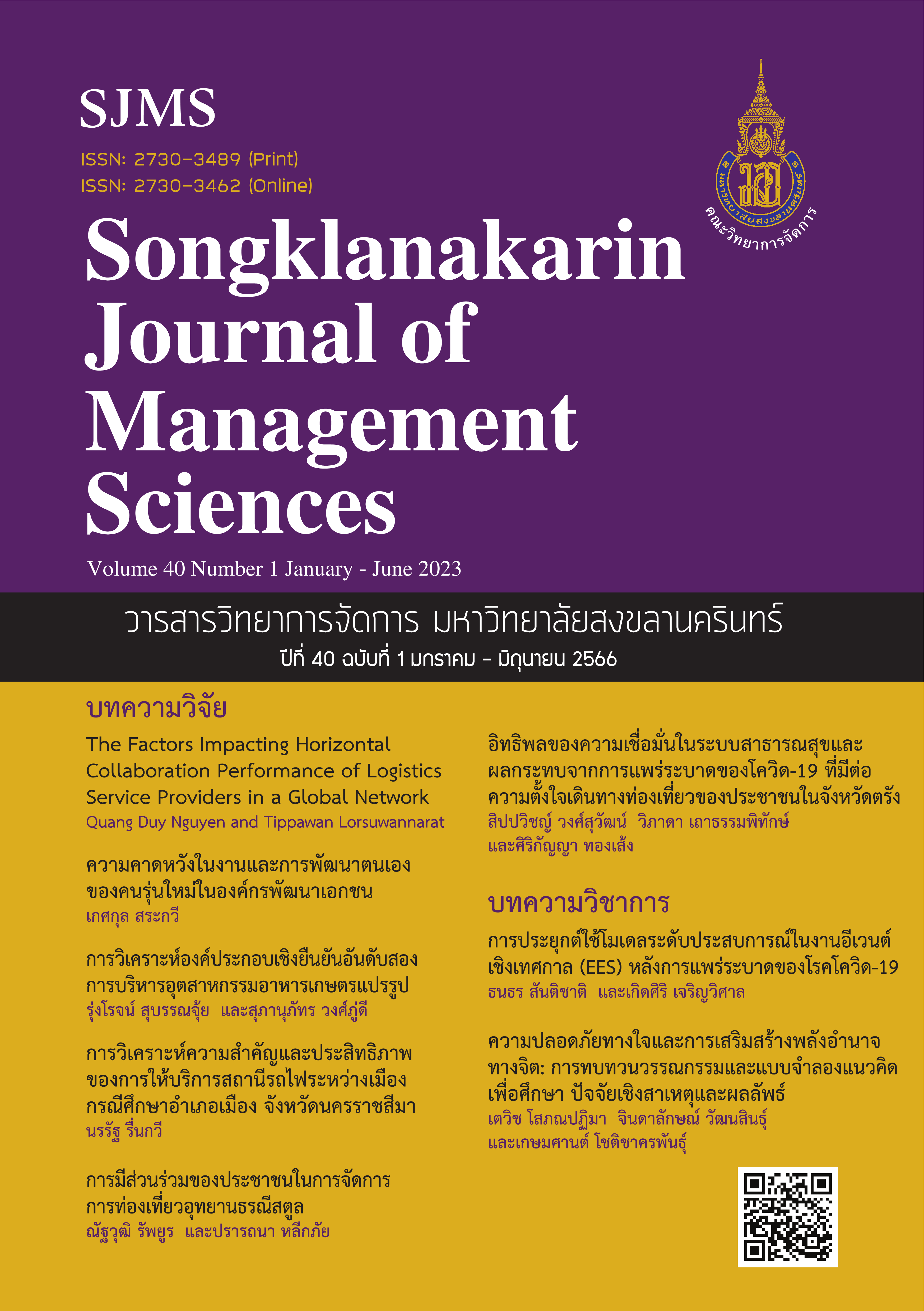Work Expectations and Self-Development of New Generations in Non-governmental Organizations
Main Article Content
Abstract
The new generation has been generally known as the main workforce in the economy and a significant force driving current work in social development. The purpose of this research was to study work expectation, work motivation and self-development of the new generation in NGOs. A qualitative research was conducted with new generation. Twelve key informants were recruited based on the basis of purposive sampling. The criteria of the selected key informants were being 35 years old or younger and having not over 10-year-experience in NGOs Thailand. To analyze the data, four steps of the content analysis were done; data organization, data display, data interpretation, and data validation. The research finding indicated (1) work motivation of the new generation includes: (1.1) intrinsic motivation for happiness and work-life balance which was not different from the new generation of other organizations; however, all young NGOs had prominent social ideological motivations and (1.2) extrinsic motivation in terms of salary, compensation and benefits, although these were not the main motivation, they may affect working with the organization in later stages. (2) work expectation that reflected the perspective on the development work as well as affected future plans in 3 ways: quit to create their own job, resign to work for another organization, and work in the original organization. (3) self-development that the new generation was interested in was knowledge and skills. This research proposes the key elements of administering NGOs and applies the concept of work expectations and values in NGO work.
Article Details

This work is licensed under a Creative Commons Attribution-NonCommercial-NoDerivatives 4.0 International License.
All published articles are SJMS’s copyright. The editorial board allows all published articles to be copied, excerpted, or disseminated with academic citation.
References
Beloe, S., Elkington, J., Hester, K. F., & Newell. S. (2003). The 21st Century NGOs in the Market for Change. Sustainability, UN Global Compact, & United Nations Environment Programme. L&S Printing.
Boonchai, K., Wisartsakul, W., & Boonyarattanasoontorn, J. (2013). The report study of the role of civil society in the protection of civil rights and political rights. National Human Rights Commission of Thailand.
Dechawastanapaisarn, D., Noompaya, K., Nuanrak, J., & Puemboon, C. (2014). A study of viewpoints and Expectations of Generational Characteristics between Generation X and Y. Chulalongkorn Business Review, 36(141), 1-25.
Ecceles, J. S., & Wigfield, A. (2020). From expectancy-value theory to situated expectancy-value theory: A developmental, social cognitive, and sociocultural perspective on motivation. Contemporary Educational Psychology, 61(April 2020), 1-13.
Gadetud, A. (1998). Comparative Study on Factors Influencing Decision of Junior and Senior Social Worker who work for Non-Government Organizations (NGOs) in Bangkok Metropolitan area. Thesis of Master of Faculty of social Ministration, Thammasat University.
Janya, S. (2007). Development and roles of Thai NGOs. Journal of environmental management, 3(1), 85-116.
Jindasuwan, L. (2014). Attitudes of the New Generation toward Employer of Choice. A minor thesis of Master of labor and welfare development of social work, Thammasat University.
Jituea, N. (2018). The Organizational Commitment of Generation Y Employees Company in a Service Business in Bangkok. The golden teak: Human and Social Science Journal, 24 (special issue), 53-65.
Junpet, T. (2014). Self Development of Adults. Kuakarun Journal of Nursing, 21(1), 17-23.
Maxwell, J. A. (2013). Qualitative Research Design: An Interactive approach. Singapore: Sage Publishing.
Mitrakul, S., & Kongchan, A. (2016). Generation Y in the Workplace: A Study of the Relationship between Value Congruence and Organizational Commitment. Journal of Management Sciences, 33(1), 51-75.
Patcharaworrapas, O. (2004). Non-Government Organization in Thialand. Suddhiparitad Journal. 18(54), 73-80.
Pimpaporn, T., & Siriwong, P. (2016). The Social Construction Meaning, Source of Meaning and Work Happiness Components of University Lectures in Generation Y: Research to Create Grounded Theory. Journal of Liberal Arts, Ubon Ratchathani University, 12(1), 109-144.
Potisita, C. (2009). Science and Arts of Quality Research. Bangkok: Amarin Printing and Publishing.
Rakdhum, S. (2010). Career Advancement of Workers. Bankgkok: A minor thesis of Min a Non-Governmental. A minor thesis of Master of labor and welfare development of social work, Thammasat University.
Salamon, L. M., & Helmut K. A. (1996). The International Classification of Nonprofit Organizations: ICNPO-Revision. Working Papers of the Johns Hopkins Comparative Nonprofit Sector Project, no. 19. Baltimore: The Johns Hopkins Institute for Policy Studies.
Srakawee, K. (2019). Expectations of New Generations in Non-governmental Organizations. Journal of Management Sciences, 36(1), 102-127.
Suwannarat, G. (2004). Unfinished Business: ODA-Civil Society Partnership in Thailand. Translated by Pakdeebudh, J. Bangkok: CPCS, National Institute of Development Administration (NIDA).
ThongAun, P. (1999). Human behavior and self-development. Bangkok: Third wave Education.
Wigfield, A., & Tonks, S., & Klauda, S. (2016). Expectancy-value theory.
Williams, K. C., & Page, R. A. (2011). Marketing to the Generations. Journal of Behavioral Studies in Business. 3(April 2011), 1-17. Retrieved May 21, 2020, from www.aabri.com/manuscripts/10575.pdf
Wong, M., Gardiner, E., Lang, W., & Coulon, L. (2008). Generational differences in personality and motivation Do they exist and what are the implications for the workplace? Journal of Managerial Psychology, 23(8), 878-890.
Yin, R. K. (2009). Case Study Research: Design and Methods. California: Sage Publications Inc.

